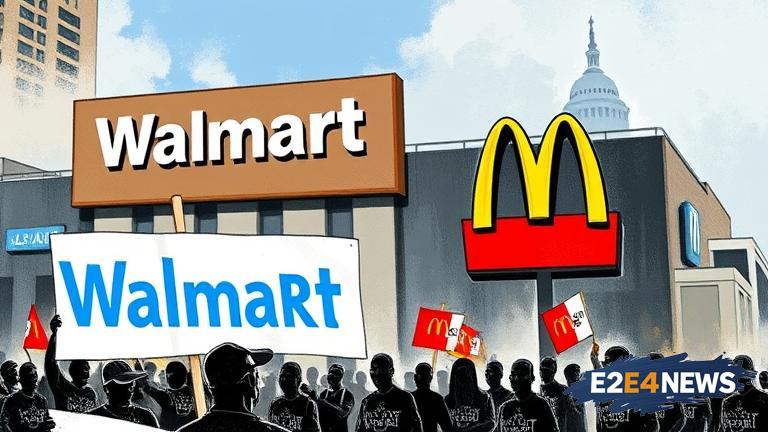A nationwide boycott of retail giant Walmart and fast-food chain McDonald’s is set to begin on August 1, as Americans take a stand against the companies’ alleged mistreatment of workers, low wages, and questionable corporate practices. The boycott, which has been gaining momentum on social media, aims to raise awareness about the plight of workers in the retail and service industries. According to reports, many Americans are fed up with the companies’ prioritization of profits over people, and are calling for better working conditions, higher wages, and greater benefits for employees. The boycott is also seen as a response to the growing wealth gap in the United States, with many citizens feeling that large corporations like Walmart and McDonald’s are contributing to the problem. Walmart, the largest private employer in the US, has faced criticism for its treatment of workers, including low wages, limited benefits, and poor working conditions. McDonald’s, on the other hand, has been accused of exploiting its workers, with many employees earning minimum wage or just above it. The boycott is being organized by a coalition of labor unions, community groups, and social justice organizations, who are urging Americans to avoid shopping at Walmart and eating at McDonald’s until the companies agree to improve their treatment of workers. The movement has gained significant traction on social media, with many people sharing their own experiences of working at Walmart or McDonald’s and calling for change. Some have also criticized the companies’ business practices, including their use of tax loopholes and offshore accounts to avoid paying taxes. The boycott has sparked a national conversation about the role of corporations in society and the need for greater accountability and transparency. As the boycott begins, many are wondering what impact it will have on the companies’ bottom line and whether it will lead to meaningful changes in their treatment of workers. The movement is also seen as part of a larger trend of worker activism and organizing in the US, with many employees demanding better pay, benefits, and working conditions. In recent years, there have been numerous strikes and protests by workers in the retail and service industries, including the Fight for $15 movement, which has called for a higher minimum wage and greater benefits for low-wage workers. The boycott of Walmart and McDonald’s is seen as a key moment in this movement, with many hoping that it will lead to significant improvements in the treatment of workers. However, others have questioned the effectiveness of the boycott, arguing that it may not have a significant impact on the companies’ profits or practices. Despite this, the movement is seen as an important step towards raising awareness about the issues faced by workers in the retail and service industries. As the boycott continues, it will be important to monitor its impact and see whether it leads to meaningful changes in the treatment of workers. The movement is also likely to spark a wider conversation about the role of corporations in society and the need for greater accountability and transparency. In the coming weeks and months, it will be important to watch how the boycott unfolds and what impact it has on Walmart, McDonald’s, and the wider economy. The boycott is a call to action for Americans to take a stand against corporate greed and demand better treatment of workers. It is a movement that is driven by a desire for fairness, justice, and equality, and one that is likely to have far-reaching consequences. The boycott of Walmart and McDonald’s is a significant moment in the history of worker activism in the US, and one that will be watched closely by labor unions, community groups, and social justice organizations. As the movement gains momentum, it will be important to consider the potential impact on the companies involved, as well as the wider economy. The boycott is a reminder that consumers have the power to shape the behavior of corporations and demand better treatment of workers. It is a movement that is driven by a sense of solidarity and a commitment to fairness and justice. The boycott of Walmart and McDonald’s is a call to action for Americans to take a stand against corporate greed and demand better treatment of workers. It is a movement that is likely to have far-reaching consequences and one that will be watched closely in the coming weeks and months.
